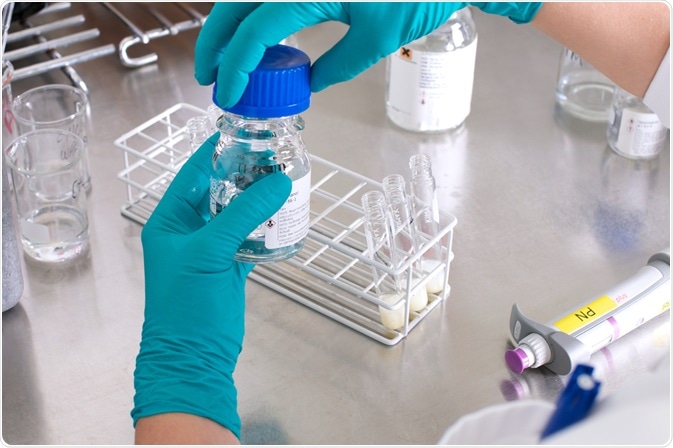Metabolomics is the study of the metabolome, a number that is characterized as a complete set of low molecular weight metabolites present in the cells, tissues, biological fluids, or the body.

Image Credit: Brian Holm/Shutterstock.com
Compared to genomics and proteomics, metabolomics is a relatively new field, and many attempts have been made, and are still emerging, to effectively outline the complete metabolic scenario of living organisms.
Since concentrations and activities of metabolites are regulated both at transcriptional (genomic) and translational (proteomic) levels, metabolomics is considered as an efficient means of converting genomic and proteomic changes into particular cellular phenotypes, which are visible in naked eyes.
For this reason, metabolomics is becoming a prime requisite for many fields apart from general education, including the healthcare setting, pharmaceutical industries, clinical chemistry, pre-clinical trials, and toxicology.
Unlike the human genome, which is now fully sequenced and freely available, metabolomics is still in its developing stage.
One major difficulty in estimating metabolites is that the number of metabolites is not same in all tissues, as every tissue serves different metabolic functions.
In addition, the concentration of metabolites is not constant and keeps changing from one time point to another, depending on the body’s metabolic demand. Despite these hurdles, many successful efforts have been made to enlist an ever-growing number of metabolites.
What's Metabolomics and What Does it Tell You About Your Health | Sci NC
The Human Metabolome Project
The Human Metabolome Project (HMP) is an attempt that has been undertaken to aid metabolomics research.
Launched in January 2005 and funded by Genome Canada, the main objectives of $7.5 million project HMP include improvement in disease identification, prognosis, and monitoring; evaluation of drug metabolism and toxicology; creating a link between the human metabolome and the human genome; and the development of software for metabolomics.
The project is primarily aimed at identifying, quantifying, indexing, and storing all metabolites that could be found in the human body at concentrations greater than 1 micromolar.
The project also aimed to create a Human Metabolome Database, an electronic database, to make the data freely available to all researchers.
In addition, HMP also aims to create a Human Metabolome Library to make all compounds publicly available.
Thus, the primary focus of HMP is to provide chemical data and chemical compounds to the scientific community for its utilization in research and the academe; however, the project is not intended for the utilization of such chemical compounds for disease identification and characterization.
The Human Metabolome Database
The Human Metabolome Database (HMDB) is a freely-accessible electronic database combining bioinformatics, chemical informatics, and medical informatics.
The database contains information on metabolite concentration and structure, associated enzymes or transporters, physiological and disease-related properties, and related chemical reactions and metabolic pathways.
The latest version of the database, HMDB 4.0, also includes a large number of predicted MS/MS (mass spectrometry) and GC-MS (gas chromatography-mass spectrometry) reference spectral data and predicted metabolite structures to facilitate the identification of novel metabolites.
In addition, information on metabolite—single nucleotide polymorphism interactions and the effect of drugs on metabolite concentrations—are also included.
Presently, HMDB includes details of 114,100 known, expected, and predicted metabolites. In addition, it contains experimentally measured and computationally-predicted nuclear magnetic resonance (NMR), MS/MS, and GC-MS reference spectra data of 351,754 metabolites; metabolic pathway details of 25,700 metabolites; and details of 5,498 metabolites that are associated with diseased conditions.
According to the database, the number of metabolites in human serum, urine, cerebrospinal fluid, saliva, sweat, and feces are 25,424, 4,225, 440, 1,234, 90, and 1,170, respectively.
Further Reading